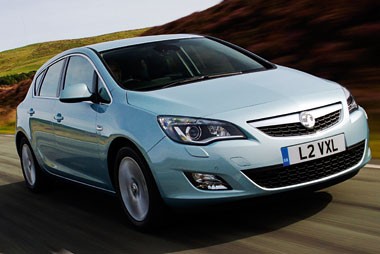Review
Shall we cut to the chase? Is Vauxhall's new Astra better than its nemesis, the Ford Focus?
Overall, the answer is yes – let's face it, if it wasn't there would be some red faces at GM, especially as a new Focus arrives later next year.
For now, the new Astra offers fresher styling, a better interior in terms of design and material quality, a more comfortable drive and enough toys to keep drivers happy no matter what trim level they opt for.
Much is made of the Focus' handling dynamics, and some media reports say the Focus is still the better drive.
So what? Do you or your drivers really take a car to such extremes in daily driving that you could notice the difference. Hopefully not.
What's most important, and where the Astra excels, is in its comfort. While GM's chassis dynamics experts in the UK have refined the steering for this country, it is the ride comfort which really impresses.
Even traversing some poorly maintained British backroads fail to ruffle the Astra's chassis, with the supple suspension soaking up ruts and bumps and dispatching them with ease.
For a high-mileage driver, this focus on comfort will be far more welcome than the alacrity of turn-in.
The new Astra is available to order now, with deliveries scheduled for December 11.
It will initially only be offered as a five-door hatchback, built at the Ellesmere Port plant, but next year will see several new additions.
A new estate version, now badged Sports Tourer like its Insignia big brother, aims to bring a more 'lifestyle' offering to the lower-medium estate market, while a Sport Hatch three-door model is pencilled in for 2012.
An Ecoflex model will be launched next spring, offering CO2 emissions of 109g/km from its 1.3-litre 90bhp diesel engine. This qualifies it for the full first year writing down allowances.
Eventually, the new chassis will spin-off an Astravan estate and a TwinTop coupe-cabriolet version, plus the obligatory VXR hot hatch, although no dates for their release have been set.
The five-door range will be offered with five petrol engines, including the new 1.4-litre ranging in power from 87bhp to 140bhp in turbocharged form. Two 1.6-litre units will also be offered in 115 and 180bhp guises.
On the diesel front, the 1.7-litre CDTi unit is carried over but has been reworked with a particulate filter to meet Euro V emission regulations.
It will offer either 110 or 125bhp, while a 2.0 CDTi with 160bhp is borrowed from the Insignia.
Trim levels are simplified, and also echo the Insignia, with S, Exclusiv, SRi, SE and Elite offered. Exclusiv and SRi are expected to account for 50% of fleet sales volumes, split between essential need drivers and user-choosers.
Standard equipment across the range includes ESP stability control, six airbags, air conditioning, electric windows, daytime running lights and a CD/radio with MP3 compatibility.
The fleet-friendly Exclusiv trim level now adds cruise control and ambient interior lighting as standard.
Vauxhall is awaiting results from the EuroNCAP crash tests, but is confident of a full five-star rating.
Prices start at £15,675 for a 1.4 Exclusiv – £270 more than the current version but now with air conditioning as standard. The lead-in diesel is the 1.7 CDTi Exclusiv 110, priced at £18,015 – £15 more than the 1.7 CDTi 100 Life.
Vauxhall isn't revealing sales expectations for the new Astra – the rollercoaster nature of the market at present makes such projections meaningless, but there is no denying the massive importance of the Astra to Vauxhall.
In 2008 it sold 54,000 five-doors, 21,000 Sport Hatches, 9,000 estates and 5,000 TwinTops. That was enough for the Astra to take 4% of the UK's new car market, with fleet accounting for around 70% of registrations.
Residual value predictions from CAP are strong, with most models booking at between 20 and 22% of price new retained after four years/80,000 miles.
The likely fleet best-seller, the 1.7 CDTi 110 Exclusiv, comes in at 21%, beating the 19% of its Focus equivalent.
















